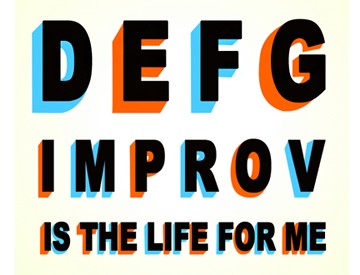“I got arrested,” the broad shouldered young man says to an older woman he met fifteen minutes ago. Then he smiles, spreads his arms up in to the air and proclaims, “I failed!”
The older woman in the cardigan applauds him, takes a beat and says “Me too!” These strangers, with seemingly little in common except this confession, laugh together. They are twenty minutes in to their first Free Intro to Improv Class at Merlin Works.
I’ve done this activity with thousands of people from all walks of life. It sounds downright awful: go up to a stranger, admit a personal or professional failure, smile, bow, and let them applaud you. Then return the favor. But it’s surprisingly delightful. It changes the energy in the room and bonds people who initially feel defensive and self conscious when the class begins.
Although I’ve been doing this exercise for years, it wasn’t until I read To Sell Is Humanby Daniel Pink, this year’s bestselling (and also really good) business book, that I got some new insight in to why this exercise is so powerful. Pink outlines the three qualities that make a person great at sales in today’s market. He calls them “the new ABC’s of moving others”: Attunement, Buoyancy, and Clarity. Each of these qualities is something I’ve been teaching in my improv classes, whether I knew it or not. And Pink actually dedicates and entire chapter of his book to improv training, so the guy’s got to be on to something, right?

- Personal: This is my fault.
- Permanent: I always do this.
- Pervasive: Everything’s ruined.
Sound familiar? This is such an accurate description of where many of our heads spin when we make a mistake. And it paralyzes us. We can’t move forward. We can’t let it go. We are stuck in a very sucky place.
People who are resilient have a different way of self talk. Buoyant people see mistakes as:
- Impersonal: There’s some external reasons for why this happened.
- Temporary: I’ve had successes before and I will again.
- Limited: This is an isolated incident.
This helps people shake it off and get back in the game. It gets to the heart of the spirit of play I try to teach– take the game seriously and yourself not, take a failure bow and get back in to play, that mistakes are gifts to be honored. In improv class and applied improv corporate training, we get to practice this stuff in a low pressure setting, hoping to re-wire some of our routine responses.
 I’m excited to incorporate this idea of buoyancy more explicitly in to the classes because the benefits are clearly huge. In Seligman’s Research, Buoyancy was the number one predictor of sales success. It allowed people to get back in there and try again with a positive attitude, giving them the numbers they need to achieve the success they desire.
I’m excited to incorporate this idea of buoyancy more explicitly in to the classes because the benefits are clearly huge. In Seligman’s Research, Buoyancy was the number one predictor of sales success. It allowed people to get back in there and try again with a positive attitude, giving them the numbers they need to achieve the success they desire.Founder, Merlin Works


